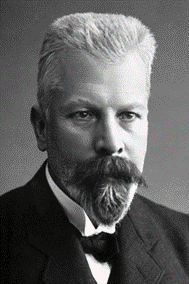EDUARD BUCHNER
·
The Nobel
Prize Laureate in Chemistry is regarded as one of the “Fathers of Modern
Biochemistry”.
· Eduard Buchner
was awarded the Nobel Prize in 1907 for Chemistry for
discovering “Cell - free Alcoholic Fermentation”. He demonstrated that “The Fermentation of Carbohydrates results from the action of
different Enzymes contained in Yeast and not the yeast cell itself”. He showed that
an enzyme “Zymase” can be extracted from yeast cells and that
it causes sugar to break up into Carbon-di-oxide and Alcohol.
·
Eduard Buchner’s
work began the field of Biochemistry and the study of Metabolism, a term that
refers to “the sum of all chemical reactions within an organism”.
· Eduard Buchner laid the foundation stone for modern in vitro Enzymology from his studies on the conversion of Sugar into Ethanol in the presence of Zymase derived from Yeast.

Comments
Post a Comment